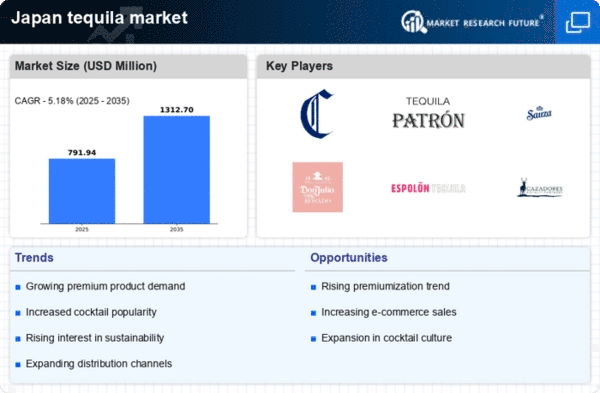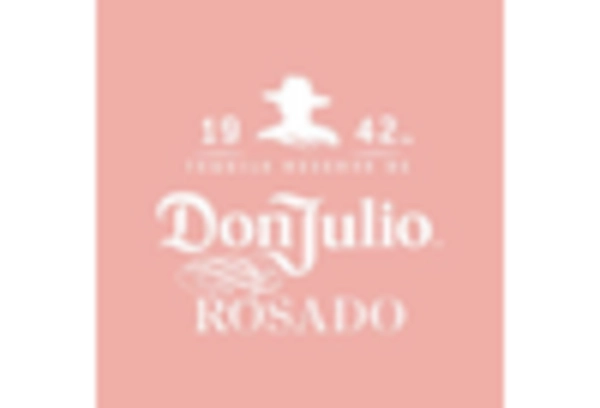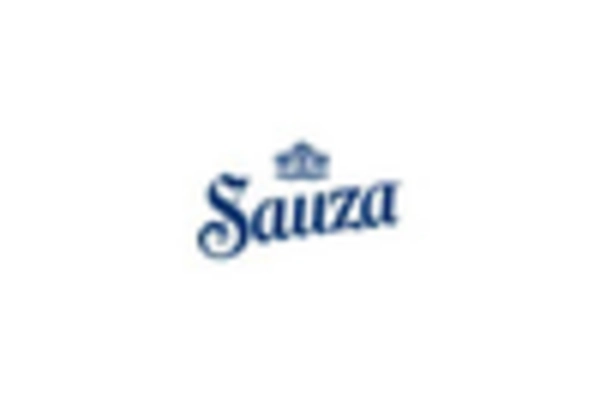Cultural Events and Festivals
Cultural events and festivals play a pivotal role in promoting the tequila market in Japan. Various festivals celebrating Mexican culture, such as Cinco de Mayo, have gained popularity, providing opportunities for tequila brands to showcase their products. These events often feature tastings, workshops, and educational sessions about tequila, fostering a deeper appreciation for the spirit among attendees. In 2025, it is anticipated that participation in cultural events will contribute to a 15% increase in tequila sales during festival seasons. Such occasions not only enhance brand visibility but also encourage consumers to explore different tequila varieties. The integration of tequila into cultural celebrations is likely to strengthen its position in the Japanese market.
Rising Demand for Premium Spirits
The tequila market in Japan experiences a notable increase in demand for premium spirits. This trend is driven by a growing consumer preference for high-quality, artisanal products. As Japanese consumers become more discerning, they seek out premium tequila brands that offer unique flavor profiles and production methods. In 2025, the premium segment of the tequila market is projected to account for approximately 35% of total sales, reflecting a shift towards higher-priced offerings. This inclination towards premiumization is indicative of a broader trend in the spirits industry, where consumers are willing to pay more for perceived quality and authenticity. Consequently, brands that emphasize craftsmanship and heritage are likely to thrive in this evolving market landscape.
E-commerce Growth and Online Sales
The rise of e-commerce is transforming the tequila market in Japan, providing consumers with greater access to a diverse range of tequila brands. Online platforms enable consumers to purchase premium and niche products that may not be available in local stores. In 2025, it is estimated that online sales will account for approximately 25% of total tequila sales in Japan, reflecting a shift in consumer purchasing behavior. This trend is particularly appealing to younger consumers who prefer the convenience of online shopping. As e-commerce continues to expand, tequila brands that invest in digital marketing and online distribution channels are likely to capture a larger share of the market. The growth of online sales presents both opportunities and challenges for traditional retailers in the tequila market.
Influence of Mixology and Cocktails
The tequila market in Japan is significantly influenced by the rise of mixology and cocktail culture. Bartenders and mixologists are increasingly incorporating tequila into innovative cocktail recipes, enhancing its visibility and appeal among consumers. This trend is evident in urban areas where cocktail bars and restaurants showcase tequila-based drinks, often highlighting the spirit's versatility. In 2025, it is estimated that cocktails will represent around 40% of tequila consumption in Japan, indicating a shift from traditional drinking habits. The growing interest in craft cocktails encourages consumers to explore different tequila brands and styles, thereby expanding the market. As the cocktail culture continues to evolve, the tequila market is likely to benefit from increased experimentation and creativity in drink offerings.
Health Consciousness and Low-Calorie Options
Health consciousness among Japanese consumers is emerging as a significant driver for the tequila market. As individuals become more aware of their dietary choices, there is a growing demand for low-calorie and organic spirits. Tequila, particularly when consumed neat or in low-calorie cocktails, is perceived as a healthier alternative to other alcoholic beverages. In 2025, it is projected that low-calorie tequila options will capture approximately 20% of the market share, appealing to health-conscious consumers. This trend aligns with the broader movement towards wellness and moderation in alcohol consumption. Brands that offer organic or low-calorie tequila options may find a receptive audience among Japanese consumers seeking healthier drinking alternatives.
















